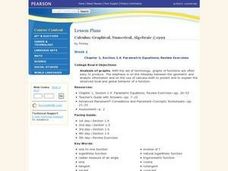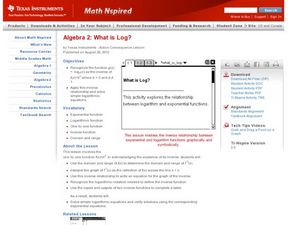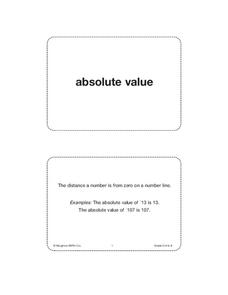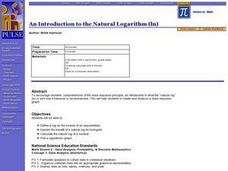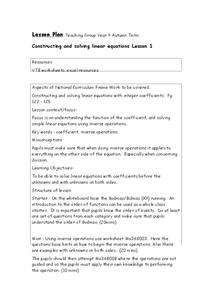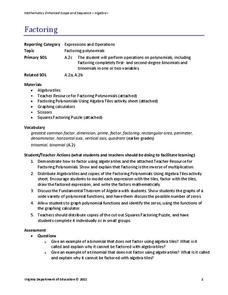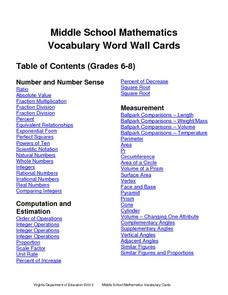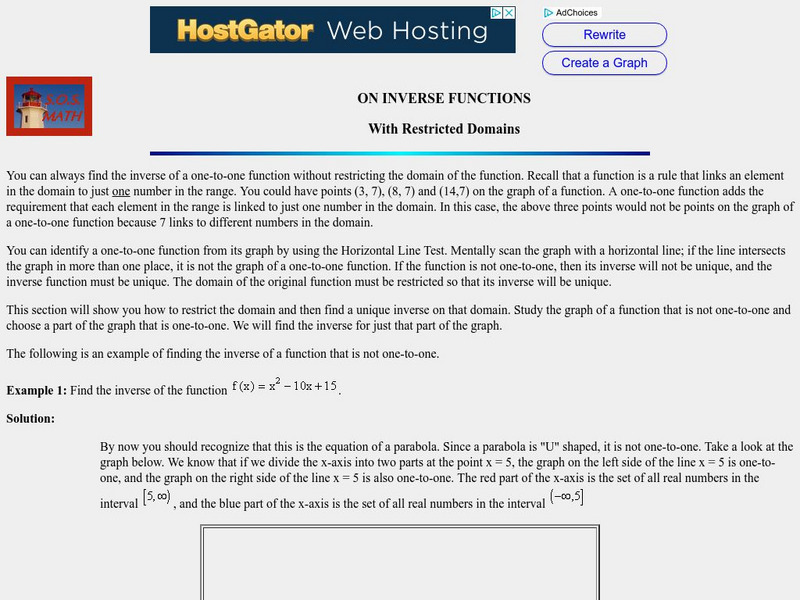Curated OER
Calculus: Graphical, Numerical, Algebraic
Students explore the interplay between the geometric and analytic information and on the use of calculus both to predict and to explain the observed local and global behavior of a function. They write a paragraph describing any...
Curated OER
Algebra II: Crickets-Nature's Thermometer
Students translate functional relationships into equations to answer questions. Students answer questions using different representations of the relationships: function rules, graphs of the function, tables of values, and equations and...
Curated OER
What is Log?
Young mathematicians differentiate between logs and natural logs in this algebra lesson. They solve functions and logarithmic functions. Learners also graph and rewrite the exponential and log functions.
Houghton Mifflin Harcourt
Unit 8 Math Vocabulary Cards (Grade 5)
Reinforce math vocabulary with a set of flash cards. With a total of forty-eight cards, each are printed in bold font, and include definition cards that offer a labeled example. Terms include absolute value, ordered pair, variable and...
Curated OER
Forms Of Relations
Students identify relations and functions. For this algebra lesson, students map points and decide whether the mapping is a function or not. They find the inverse and examine relations for functions.
Curated OER
Oodles of Poodles
Students solve equations by graphing. For this algebra lesson, students differentiate between functions and relations. They use the TI to graph their equation and analyze the graph.
EngageNY
Solving Exponential Equations
Use the resource to teach methods for solving exponential equations. Scholars solve exponential equations using logarithms in the twenty-fifth installment of a 35-part module. Equations of the form ab^(ct) = d and f(x) = g(x) are...
Curated OER
A.P. Calculus Prerequisite No Calculator Multiple-Choice and Free-Response Exam
In this A.P. Calculus pre-requisites learning exercise, students solve ten multiple-choice and ten free-response questions. Many of these questions cover trigonometric functions.
Curated OER
Stressed to the Breaking Point
High schoolers explore the relationship between the amount of weight that can be supported by a spaghetti bridge, the thickness of the bridge, and the length of the bridge to determine the algebraic equation that best represents that...
Curated OER
An Introduction to the Natural Logarithm (ln)
Students explore the dose response principle, an introduction to what the "natural log" (ln) is and how it behaves. They create and analyze a dose response graph.
Curated OER
Constructing and Solving Linear Equations
Young scholars construct and solve linear equations. In this algebra lesson, students solve equations and graph lines using the slope. They identify the different parts of an equation including the leading coefficient.
02 x 02 Worksheets
Factoring
Factor in this resource when teaching how to factor polynomials. Scholars use algebra tiles to factor linear and quadratic expressions. They practice their skill by working on example problems from a worksheet.
Virginia Department of Education
Middle School Mathematics Vocabulary Word Wall Cards
Having a good working knowledge of math vocabulary is so important for learners as they progress through different levels of mathematical learning. Here is 125 pages worth of wonderfully constructed vocabulary and concept review cards....
EngageNY
Complex Numbers and Transformations
Your learners combine their knowledge of real and imaginary numbers and matrices in an activity containing thirty lessons, two assessments (mid-module and end module), and their corresponding rubrics. Centered on complex numbers and...
Inside Mathematics
Hexagons
Scholars find a pattern from a geometric sequence and write the formula for extending it. The worksheet includes a table to complete plus four analysis questions. It concludes with instructional implications for the teacher.
Mathematics Vision Project
Module 8: Statistics
What does it mean to be normal in the world of statistics? Pupils first explore the meaning of a normal distribution in the eight-lesson module. They then apply the statistics related to normal distributions such as mean, standard...
EngageNY
Building Logarithmic Tables
Thank goodness we have calculators to compute logarithms. Pupils use calculators to create logarithmic tables to estimate values and use these tables to discover patterns (properties). The second half of the lesson has scholars use given...
Curated OER
Activity One Teacher Page: Vehicles In Motion
Students identify variables that affect the system, and specify which variables are independent and which are dependent.
Curated OER
Conjectures and Conclusions
Students draw conclusions and make conjectures given a specific scenario. In this geometry lesson, students model real life scenarios using properties of triangles. They model number facts and explain why the outcome is what it is.
Curated OER
Electric Field Mapping in 3D
Young scholars create a 3D vector field map of an electric field. In this physics lesson, students measure the voltage inside an aquarium with water. They present their findings and map to class..
Pennsylvania Department of Education
Alike and Different
Students compare and contrast objects and are introduced to a Venn Diagram. In this alike and different lesson, students make observations regarding properties of objects. Students classify object and build ideas about variables....
Curated OER
Pyrotechnics
Students discuss pyrotechnics and what they have noticed about their height and speed. They think about the path which fireworks follow which is a parabola. They follow multiplication patterns to determine the Zero Product Property and...
Math Medics
S.o.s. Math: Inverse Functions
This tutorial contains four lessons on inverse functions (on five pages) including an introduction, inverse functions with no domain restriction, composition of functions, and inverse functions with domain restriction. Includes practice...
Math Medics
S.o.s. Math: On Inverse Functions With Restricted Domains
Offers a step-by-step explanation of a one-to-one function problem on inverse functions with restricted domains, clearly using the horizontal line test. Includes sample problems.


